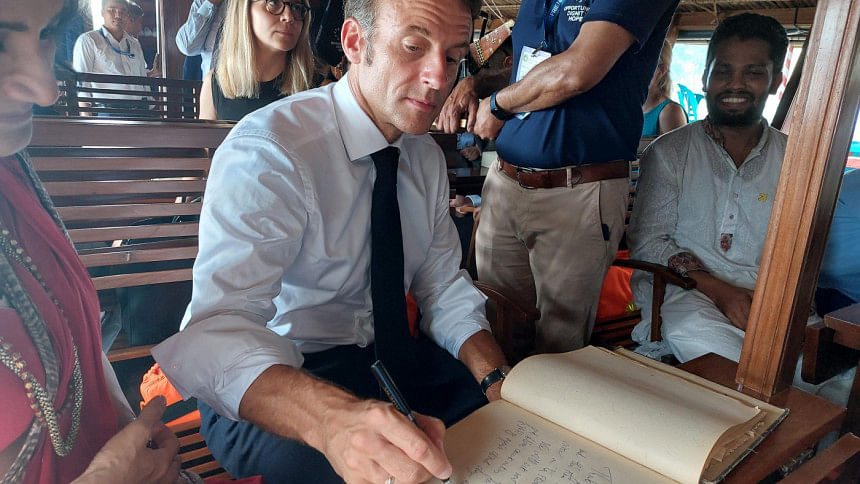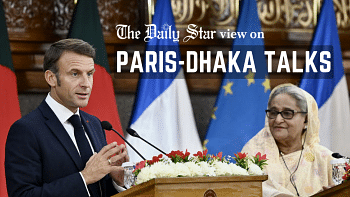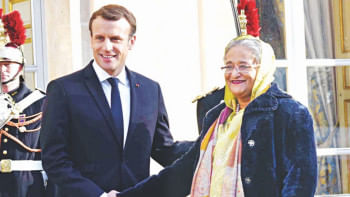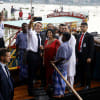Macron’s support for an ‘adaptation pact’ with Bangladesh

During the short visit of French President Emmanuel Macron to Bangladesh, he wanted to take a boat ride on the Turag River and also meet with certain individuals to discuss what to do to tackle climate change. I was privileged to be one of four individuals selected to spend nearly an hour with Macron on the boat ride. The others were MP and Climate Envoy Saber Hossain Choudhury, Runa Khan of Friendship NGO (who had organised the boat trip), and Sohanur Rahman, a very active youth climate worker. All four of us also had the opportunity to attend the Summit for a New Global Financial Pact in Paris, hosted by President Macron, a few months ago.
During the conversation, President Macron first wanted to hear from each of us about our own work and views regarding the collaboration between Bangladesh and France in tackling climate change.
Each one of us was able to share details of our work with him, which I won't go into here. Rather, I would like to share what the French president had to say to us and what he offered to collaborate on.
Macron first told us that he had had a one-on-one conversation with Prime Minister Sheikh Hasina already in which he'd offered assistance from France to Bangladesh to work on an energy transition partnership. France (alongside other European countries) has already engaged in such initiatives with a number of other developing countries, such as South Africa and Indonesia, wherein France has provided hundreds of millions of euros to help these countries transition from fossil fuel-based economies to renewable energy-based economies.
The second initiative Macron invited Bangladesh to join was the Global Biodiversity Framework Fund (GBFF) that has been created recently to support the conservation of both terrestrial and aquatic biodiversity in different countries. For this, he offered support from France in terms of carrying out nature-based solutions. Macron was particularly interested in supporting the conservation of mangrove forest ecosystems.
Thirdly, he felt, quite rightly, that climate change adaptation planning and implementation must be done at the national level in each country and that they must focus on supporting the poorest and most vulnerable communities in each country. These should not be imposed from the outside.
When we told him about Bangladesh being a leader in adaptation, and particularly in locally-led adaptation, he was impressed and made an offer to enter into an "adaptation pact" with Bangladesh to support a truly bottom-up adaptation programme involving the government, civil society, and particularly the youth, in order to enable Bangladesh to tackle climate change. He offered to increase the funding that Bangladesh receives each year from France through the French Development Agency (AFD) to support the pact and also promised to get other developed countries to provide funding support as well.
We also had Information Minister Muhammad Hasan Mahmud with us, and were able to promise to get back to President Macron with a proposal to enter an adaptation pact by COP28 in Dubai this December.
The onus is therefore ours to do a quick evaluation and prioritise some of the most promising activities already identified in the various plans that we have developed – including the Bangladesh Climate Change Strategy and Action Plan (BCCSAP), the National Adaptation Plan (NAP), the Mujib Climate Prosperity Plan (MCPP), and the Delta Plan 2100 – to prepare the first bilateral adaptation pact between Bangladesh and France.
Such a bilateral pact could become a replicable model for other developing countries to prepare and pair themselves with a developed country for support in tackling the impacts of climate change.
Dr Saleemul Huq is director of the International Centre for Climate Change and Development and a professor at Independent University, Bangladesh.
Views expressed in this article are the author's own.
Follow The Daily Star Opinion on Facebook for the latest opinions, commentaries and analyses by experts and professionals. To contribute your article or letter to The Daily Star Opinion, see our guidelines for submission.

 For all latest news, follow The Daily Star's Google News channel.
For all latest news, follow The Daily Star's Google News channel. 










Comments